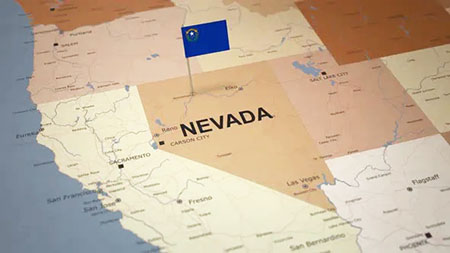Special to WorldTribune, June 22, 2021
Analysis by R. Clinton Ohlers
Officials in Nevada have threatened state citizens who requested an audit of the 2020 presidential election results with misdemeanors and class C felonies. The occasion of the threats are two affidavits filed in Nye and Lyon counties.
“I am currently working with a nonpartisan group of concerned Nevadans, advocating for our state constitutional right to an audit,” Nevada citizen Mindy Robinson wrote in the D.C. Patriot.
 “Turns out it’s not up to the People to prove fraud to the courts to get an audit according to Nevada’s state constitution, it’s actually up to the State to prove all elections are fair and valid if the People demand it… and we’re demanding it. Last week notarized affidavits from all over Nevada were certified-mailed to the appropriate state officials demanding their right to a forensic audit.”
“Turns out it’s not up to the People to prove fraud to the courts to get an audit according to Nevada’s state constitution, it’s actually up to the State to prove all elections are fair and valid if the People demand it… and we’re demanding it. Last week notarized affidavits from all over Nevada were certified-mailed to the appropriate state officials demanding their right to a forensic audit.”
In response, County Recorders in Lyon and Nye counties responded with ambiguously worded rejections of the affidavits, followed by very unambiguous threats of possible criminal charges if demands for audits are pushed further.
As if responding in tandem, both County Recorders issued the same causes for denial to record even the receipt of the affidavits, and delivered the same threats.
Nye County Recorder Deborah Beatty and Lyon County Recorder Margie Kassebaum stated that the filers “have the right to request judicial review of this denial” but if the subsequent refiling is not deemed to have been performed “in such a manner that it may be lawfully recorded… the violation is a misdemeanor,” unless “a greater penalty is provided.”
Further, Beatty and Kassebaum added, filers accused of “knowingly procuring” any “false or forged instrument to be filed,” may be found “guilty of a category C felony.”
It is the very ambiguity of the denials, therefore, that make the threats especially concerning.
Robinson observes:
First they outright refuse to even record that the affidavits were received, claiming the documents were unauthorized and/or falsified based off:
NRS 41.036 – Tort claims against the state (we’re asking for an election audit based off what should be pretty obvious maladministration at this point.)
NRS 239b.030 – Personal information on affidavit (they were addressed to their public offices)
NRS 247.120 – Fee to record (nowhere on the affidavit did we ask them for a fee to record something, why would we?)
NRS 247.110 – Discretion of recorder on “format” (they never identify what the “format” issue is, but apparently they think the recorder can just throw out anything they don’t like using this excuse)
NRS 240 – Something about the fact it was notarized (why wouldn’t we notarize an affidavit to prove the person it came from was indeed living and voting in Nevada?)
Given the incomprehensibility of the reasons for the original denial, any re-filer has to wonder whether state officials’ basis for judging the submission of new affidavits as a criminal act would be equally as incomprehensible and ambiguous. The recorders’ actions appear designed solely for the purpose of intimidation.
The concerned Nevadans, however, are not backing down, and have themselves responded by increasing pressure on state legislators and the Secretary of State, encouraging fellow citizens.
“Feel free to tell them how the American People don’t take kindly to threats by a government that’s supposed to work for us. If you’d like to participate as a petitioner to demand an audit for the state of Nevada and receive your own tyrannical threatening letter to hang on your wall, you can find it in the PDF imbedded in the explanations article here,” Robinson writes.
Nevada’s Republican Secretary of State also appears to be acting as a surrogate for Democrat interests, Robinson says.
“Barbara Cegavske, the Republican Secretary of State who was censured by her own party for criminally loosening election integrity to the point of embarrassment (through mail-in ballots to every man, woman, and illegal alien alive or dead, and unconstitutionally pushing ballot harvesting through, despite it being illegal according to our own state constitution) was the very first official to reply,” Robinson writes. “She outright refused to do a forensic audit based on the fact that she claims the election was valid… because she ‘says so.’ ”
Cegavske insists that in spite of the Civil Rights Act of 1960 requiring “all records and papers” relating to “any act requisite to voting in such election” be maintained for 24 months following the election, “there is no legal process by which election officials may cause a post-election audit of voting machines and election equipment.”
Nevertheless, Cegavske assures, “based on our own review of voting machines and election processes and protocols, we are certain that Nevada’s voting machines were not sabotaged, or otherwise compromised by election workers, foreign actors, or anyone else.”
